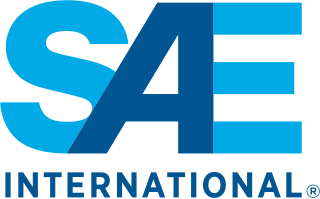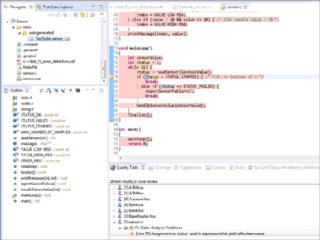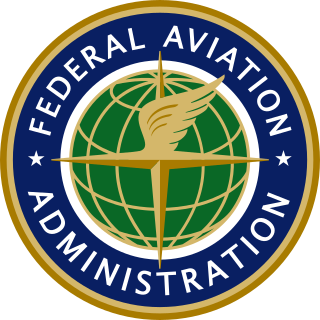In software engineering, code coverage is a percentage measure of the degree to which the source code of a program is executed when a particular test suite is run. A program with high test coverage has more of its source code executed during testing, which suggests it has a lower chance of containing undetected software bugs compared to a program with low test coverage. Many different metrics can be used to calculate test coverage. Some of the most basic are the percentage of program subroutines and the percentage of program statements called during execution of the test suite.
DO-178B, Software Considerations in Airborne Systems and Equipment Certification is a guideline dealing with the safety of safety-critical software used in certain airborne systems. It was jointly developed by the safety-critical working group RTCA SC-167 of the Radio Technical Commission for Aeronautics (RTCA) and WG-12 of the European Organisation for Civil Aviation Equipment (EUROCAE). RTCA published the document as RTCA/DO-178B, while EUROCAE published the document as ED-12B. Although technically a guideline, it was a de facto standard for developing avionics software systems until it was replaced in 2012 by DO-178C.

ARP4754, Aerospace Recommended Practice (ARP) ARP4754A, is a guideline from SAE International, dealing with the development processes which support certification of Aircraft systems, addressing "the complete aircraft development cycle, from systems requirements through systems verification." Revision A was released in December 2010. It was recognized by the FAA in AC 20-174 published November 2011. EUROCAE jointly issues the document as ED–79.
RTCA DO-254 / EUROCAE ED-80, Design Assurance Guidance for Airborne Electronic Hardware is a document providing guidance for the development of airborne electronic hardware, published by RTCA, Incorporated and EUROCAE. The DO-254/ED-80 standard was formally recognized by the FAA in 2005 via AC 20-152 as a means of compliance for the design assurance of electronic hardware in airborne systems. The guidance in this document is applicable, but not limited, to such electronic hardware items as
IEC 61508 is an international standard published by the International Electrotechnical Commission (IEC) consisting of methods on how to apply, design, deploy and maintain automatic protection systems called safety-related systems. It is titled Functional Safety of Electrical/Electronic/Programmable Electronic Safety-related Systems.
MISRA C is a set of software development guidelines for the C programming language developed by The MISRA Consortium. Its aims are to facilitate code safety, security, portability and reliability in the context of embedded systems, specifically those systems programmed in ISO C / C90 / C99.
LDRA Testbed is core static and dynamic analysis engines for both host and embedded software. LDRA Testbed is made by Liverpool Data Research Associates (LDRA). LDRA Testbed provides the means to enforce compliance with coding standards such as MISRA, JSF++ AV, CERT C, CWE and provides visibility of software flaws that might typically pass through the standard build and test process to become latent problems. In addition, test effectiveness feedback is provided through structural coverage analysis reporting facilities, which support the requirements of the DO-178B standard up to and including Level-A.
Functional safety is the part of the overall safety of a system or piece of equipment that depends on automatic protection operating correctly in response to its inputs or failure in a predictable manner (fail-safe). The automatic protection system should be designed to properly handle likely human errors, systematic errors, hardware failures and operational/environmental stress.
Linear code sequence and jump (LCSAJ), in the broad sense, is a software analysis method used to identify structural units in code under test. Its primary use is with dynamic software analysis to help answer the question "How much testing is enough?". Dynamic software analysis is used to measure the quality and efficacy of software test data, where the quantification is performed in terms of structural units of the code under test. When used to quantify the structural units exercised by a given set of test data, dynamic analysis is also referred to as structural coverage analysis.
DO-178C, Software Considerations in Airborne Systems and Equipment Certification is the primary document by which the certification authorities such as FAA, EASA and Transport Canada approve all commercial software-based aerospace systems. The document is published by RTCA, Incorporated, in a joint effort with EUROCAE, and replaces DO-178B. The new document is called DO-178C/ED-12C and was completed in November 2011 and approved by the RTCA in December 2011. It became available for sale and use in January 2012.

Parasoft C/C++test is an integrated set of tools for testing C and C++ source code that software developers use to analyze, test, find defects, and measure the quality and security of their applications. It supports software development practices that are part of development testing, including static code analysis, dynamic code analysis, unit test case generation and execution, code coverage analysis, regression testing, runtime error detection, requirements traceability, and code review. It's a commercial tool that supports operation on Linux, Windows, and Solaris platforms as well as support for on-target embedded testing and cross compilers.
Development testing is a software development process that involves synchronized application of a broad spectrum of defect prevention and detection strategies in order to reduce software development risks, time, and costs.
Automotive Safety Integrity Level (ASIL) is a risk classification scheme defined by the ISO 26262 - Functional Safety for Road Vehicles standard. This is an adaptation of the Safety Integrity Level (SIL) used in IEC 61508 for the automotive industry. This classification helps defining the safety requirements necessary to be in line with the ISO 26262 standard. The ASIL is established by performing a risk analysis of a potential hazard by looking at the Severity, Exposure and Controllability of the vehicle operating scenario. The safety goal for that hazard in turn carries the ASIL requirements.

AC 25.1309–1 is an FAA Advisory Circular (AC) that identifies acceptable means for showing compliance with the airworthiness requirements of § 25.1309 of the Federal Aviation Regulations. Revision A was releases in 1988. In 2002, work was done on Revision B, but it was not formally released; the result is the Rulemaking Advisory Committee-recommended revision B-Arsenal Draft (2002). The Arsenal Draft is "considered to exist as a relatively mature draft". The FAA and EASA have subsequently accepted proposals by type certificate applicants to use the Arsenal Draft on development programs.
Cantata++, or simply Cantata in newer versions, is a commercial computer program for dynamic testing, specifically unit testing and integration testing, and code coverage at run time of C and C++ programs. It is developed and sold by QA Systems, and was formerly a product of IPL Information Processing Ltd.

The Advisory Circular AC 20-115( ), Airborne Software Development Assurance Using EUROCAE ED-12( ) and RTCA DO-178( ), identifies the RTCA published standard DO-178 as defining a suitable means for demonstrating compliance for the use of software within aircraft systems. The present revision D of the circular identifies ED-12/DO-178 Revision C as the active revision of that standard and particularly acknowledges the synchronization of ED-12 and DO-178 at that revision.
CodeSonar is a static code analysis tool from GrammaTech. CodeSonar is used to find and fix bugs and security vulnerabilities in source and binary code. It performs whole-program, inter-procedural analysis with abstract interpretation on C, C++, C#, Java, as well as x86 and ARM binary executables and libraries. CodeSonar is typically used by teams developing or assessing software to track their quality or security weaknesses. CodeSonar supports Linux, BSD, FreeBSD, NetBSD, MacOS and Windows hosts and embedded operating systems and compilers.
DO-248C, Supporting Information for DO-178C and DO-278A, published by RTCA, Incorporated, is a collection of Frequently Asked Questions and Discussion Papers addressing applications of DO-178C and DO-278A in the safety assurance of software for aircraft and software for CNS/ATM systems, respectively. Like DO-178C and DO-278A, it is a joint RTCA undertaking with EUROCAE and the document is also published as ED-94C, Supporting Information for ED-12C and ED-109A. The publication does not provide any guidance additional to DO-178C or DO-278A; rather, it only provides clarification for the guidance established in those standards. The present revision is also expanded to include the "Rationale for DO-178C/DO-278A" section to document items that were considered when developing DO-178B and then DO-178C, DO-278A, and DO-330, as well as the supplements that accompany those publications.
The Certification Authorities Software Team (CAST) is an international group of aviation certification and regulatory authority representatives. The organization of has been a means of coordination among representatives from certification authorities in North and South America, Europe, and Asia, in particular, the FAA and EASA. The focus of the organization has been harmonization of Certification Authorities activities in part though clarification and improvement of the guidance provided by DO-178 and DO-254.

CAST-15, Merging High-Level and Low-Level Requirements is a Certification Authorities Software Team (CAST) Position Paper. It is an FAA publication that "does not constitute official policy or guidance from any of the authorities", but is provided to applicants for software and hardware certification for educational and informational purposes only.



